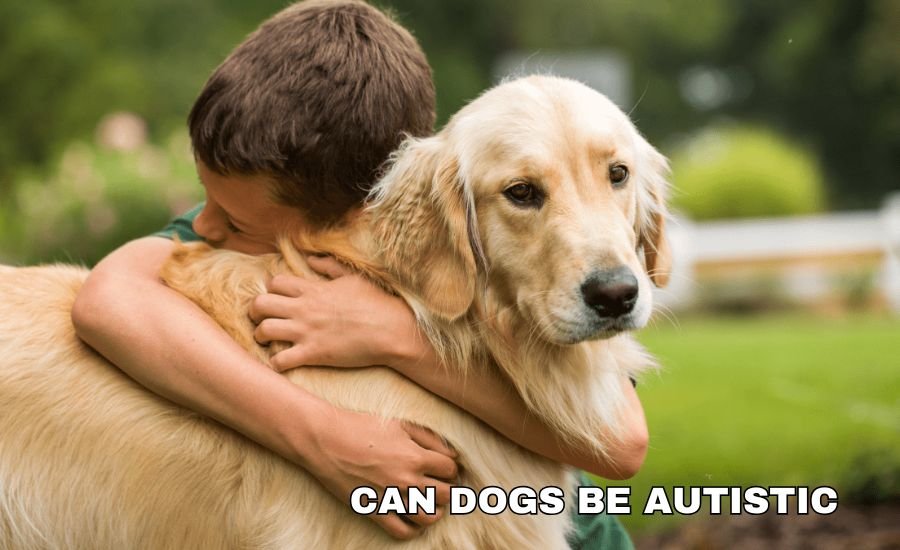When we think of autism, we often envision children struggling with social interaction, communication, and repetitive behaviors. Autism Spectrum Disorder (ASD) is a well-studied condition in humans, but what about our furry friends? As dog owners, we might wonder: can dogs be autistic? Recent discussions have revealed that some dogs may exhibit behaviors resembling those seen in humans with autism, leading to a growing interest in understanding canine autism or canine dysfunctional behavior.
In this article, we will explore the concept of autism in dogs, examining its signs, potential causes, diagnosis, and treatment options. By delving into this topic, we aim to equip dog owners with valuable knowledge to better support their pets.
What Is Autism?
Autism, commonly referred to as Autism Spectrum Disorder (ASD), is a complex neurodevelopmental disorder that affects individuals across a wide range of symptoms and severity. People with autism often face challenges in three main areas:
- Social Interaction: Individuals may struggle to understand social cues, maintain conversations, and develop relationships.
- Communication: Many autistic individuals find it difficult to express their thoughts and feelings verbally, leading to frustration and isolation.
- Repetitive Behaviors: Repetitive movements or speech patterns, as well as intense interests in specific subjects, are also common among those on the autism spectrum.
While the exact cause of autism remains largely unknown, research suggests a combination of genetic and environmental factors may contribute to its development. Understanding autism in humans provides a foundation for exploring similar behaviors in dogs.
Can Dogs Be Autistic?
The question of whether dogs can experience autism-like symptoms has intrigued veterinarians and pet owners alike. The term often used in veterinary medicine is “canine dysfunctional behavior.” While this terminology differs from autism in humans, the behaviors exhibited by some dogs can resemble those seen in children with autism.
Research into canine behavioral conditions is still in its infancy, and the diagnosis of autism in dogs is not as straightforward as it is in humans. However, certain behavioral traits in dogs suggest that they can experience challenges similar to those associated with autism in people. For example, dogs may exhibit social deficits, communication issues, and repetitive behaviors.
Causes of Autism in Dogs
Understanding the potential causes of autism in dogs is complex. The term “idiopathic” is often used to describe conditions with unknown origins, indicating that the exact cause of canine dysfunctional behavior remains uncertain. However, several factors are believed to contribute to the development of these behaviors:
- Genetic Factors: Certain breeds may have a genetic predisposition to behavioral issues. Research suggests that dogs lacking specific mirror neurons in their brains may struggle with social norms and interactions, which are essential for forming bonds with other dogs and humans.
- Environmental Influences: Early life experiences, such as trauma or inadequate socialization, can play a significant role in shaping a dog’s behavior. Dogs that are not exposed to various stimuli during their critical developmental periods may develop fears and anxieties that affect their social interactions.
- Neurological Factors: Just as in humans, neurological differences may contribute to behavioral conditions in dogs. Understanding the brain’s role in behavior is crucial for further research in this area.
Identifying Signs of Autism in Dogs

Recognizing autism-like behaviors in dogs is essential for providing the appropriate care and support they need. While diagnosing autism in dogs can be challenging, several common signs may indicate the presence of canine dysfunctional behavior:
1. Communication Problems
Dogs are known for their ability to communicate through body language and vocalizations. However, autistic dogs may exhibit limited expression of their moods. For example, a typical dog might wag its tail to show happiness or greet its owner, while an autistic dog may appear indifferent or blank. They might also enter trance-like states, staring at a fixed point for extended periods and avoiding eye contact with both humans and other dogs.
2. Antisocial Behaviors
Dogs are inherently social animals, thriving on interactions with humans and other animals. However, dogs with autism-like behaviors may prefer solitude, avoiding playtime or social engagement. Signs of antisocial behavior can include disinterest in activities that typically excite other dogs and a lack of attention during walks or feeding times.
3. Inappropriate Reactions to Stimuli
Autistic dogs may demonstrate heightened sensitivity to various stimuli. They could react inappropriately to sudden sounds, gentle touches, or even unfamiliar environments. For instance, a gentle pat on the head might cause an autistic dog to flinch or bark in response. These hypersensitive reactions can lead to fear and anxiety, making it challenging for the dog to navigate everyday situations.
4. Obsessive-Compulsive Behaviors
Repetitive motions and compulsive behaviors are hallmark signs of autism in both humans and dogs. Autistic dogs may engage in behaviors such as chronic tail chasing, circling a room multiple times, or obsessive chewing on objects. Such actions can result in physical fatigue and even self-harm, making it crucial for owners to monitor and address these behaviors.
5. Reduced Physical Activity
Dogs that exhibit autism-like behaviors often prefer sedentary lifestyles. They may show reluctance to engage in high-energy activities or playtime, leading to lethargy and disinterest in their surroundings. If a previously active dog suddenly becomes lethargic, it’s essential to consult a veterinarian to rule out any underlying health issues.
Diagnosing Autism in Dogs
Diagnosing autism in dogs is not as straightforward as diagnosing the condition in humans. While veterinarians can observe certain behaviors, the lack of concrete evidence and standardized criteria makes it challenging to provide a definitive diagnosis. Here are some key points regarding the diagnostic process:
1. Behavioral Observations
Veterinarians will often conduct behavioral assessments to evaluate a dog’s reactions to various stimuli and interactions. These assessments may include observing the dog’s behavior in different settings and situations to identify patterns indicative of canine dysfunctional behavior.
2. Ruling Out Other Conditions
Before diagnosing autism-like behaviors, veterinarians must rule out other medical or behavioral conditions that may present similar symptoms. Conditions such as anxiety disorders, neurological issues, and fear-based behaviors can mimic signs of autism, necessitating a thorough evaluation.
3. Collaboration with Professionals
If you suspect that your dog may be exhibiting autism-like behaviors, it’s essential to consult with a veterinarian or a qualified animal behaviorist. These professionals can assess your dog’s behavior and health history, providing valuable insights into the best course of action.
Treatment and Management Options
While there is no definitive treatment for canine dysfunctional behavior, several management strategies can help alleviate symptoms and improve the quality of life for affected dogs. Here are some effective approaches:
1. Medication
Although there is no one-size-fits-all medication for autism in dogs, veterinarians may prescribe certain drugs to help manage symptoms. Medications such as Fluoxetine (Prozac) are sometimes used to treat obsessive-compulsive behaviors and anxiety, providing relief for both the dog and its owner.
2. Creating a Safe Environment
Providing a safe and secure space for dogs with autism-like behaviors is essential. Autistic dogs often thrive in familiar environments, so creating a designated area where they can retreat when feeling anxious can significantly reduce stress.
3. Regular Exercise
Regular physical activity is crucial for all dogs, especially those exhibiting autism-like behaviors. Exercise helps release pent-up energy, reduces anxiety, and can serve as a distraction from compulsive behaviors. Engaging your dog in regular walks, playtime, and interactive games can improve their overall well-being.
4. Dietary Considerations
A well-balanced diet can contribute to a dog’s overall health and may help manage behavioral issues. Consulting with a veterinarian to determine the best dietary plan for your dog is essential, as some dogs may benefit from specific nutrients or supplements.
5. Positive Reinforcement Training
Using positive reinforcement techniques can be an effective way to train and support dogs with autism-like behaviors. Rewarding desired actions with treats, praise, or toys can encourage learning and promote confidence in your dog. It’s essential to work with trainers who have experience in managing dogs with behavioral issues to ensure effective training.
Read Also: Www-Goodmooddotcom-Com-Luxury-Category
Myths and Misconceptions About Canine Autism
As awareness of autism in dogs grows, several myths and misconceptions have emerged. Addressing these myths is crucial for fostering understanding and compassion for dogs exhibiting autism-like behaviors:
Myth 1: Dogs Cannot Have Autism
Contrary to popular belief, dogs can exhibit behaviors resembling autism in humans. While the underlying mechanisms may differ, many dogs display traits that align with those seen in individuals with autism.
Myth 2: Autism in Dogs is the Same as in Humans
While there are overlapping symptoms, autism in dogs is not identical to autism in humans. The cognitive and social capacities of dogs differ significantly from those of humans, necessitating a unique approach to understanding canine behavior.
Myth 3: All Behavioral Issues in Dogs are Autism
Not all behavioral problems in dogs stem from autism. Dogs may exhibit a wide range of behavioral issues due to various factors, including genetics, environment, and training. It’s crucial to differentiate between conditions and seek professional help for accurate diagnosis and treatment.
Supporting Dogs with Autism-like Behaviors

Supporting a dog with autism-like behaviors requires understanding, patience, and a tailored approach. Here are some strategies for helping these special dogs thrive:
1. Recognize and Understand the Signs
Familiarize yourself with the signs of autism-like behaviors in dogs. The more you understand your dog’s unique traits, the better equipped you’ll be to provide appropriate support.
2. Establish a Routine
Dogs with autism-like behaviors often thrive on routine and predictability. Establishing a consistent daily schedule can help reduce anxiety and provide a sense of security for your dog.
3. Create a Calm Environment
Designate a quiet space in your home where your dog can retreat when feeling overwhelmed. Keep the area free from loud noises and distractions, allowing your dog to relax and recharge.
4. Socialization and Gradual Exposure
Introducing your dog to new experiences and environments gradually can help build confidence and reduce anxiety. Start with controlled situations and gradually expose your dog to new stimuli at their own pace.
5. Engage in Enrichment Activities
Provide mental stimulation through interactive toys, puzzle feeders, and scent games. Enrichment activities can help alleviate boredom and redirect your dog’s focus from compulsive behaviors.
Conclusion
As our understanding of autism-like behaviors in dogs continues to evolve, it’s essential for dog owners to remain informed and proactive. Recognizing the signs of canine dysfunctional behavior and seeking professional help can make a significant difference in the lives of affected dogs. By creating supportive environments, providing consistent care, and employing effective training strategies, we can help our canine companions thrive.
If you suspect that your dog may be exhibiting autism-like behaviors, do not hesitate to consult with a veterinarian or an experienced animal behaviorist. With the right guidance and support, your dog can lead a fulfilling and happy life alongside you.
FAQs:
Q: Can dogs be autistic?
A: Yes, dogs can exhibit behaviors similar to autism in humans, referred to as canine dysfunctional behavior.
Q: What are the signs of autism in dogs?
A: Signs include communication problems, antisocial behaviors, obsessive-compulsive actions, sensitivity to stimuli, and reduced physical activity.
Q: How is autism diagnosed in dogs?
A: Diagnosis involves observing behavioral patterns, ruling out other conditions, and consulting with a veterinarian or animal behaviorist.
Q: Is there a treatment for autism in dogs?
A: While there is no specific treatment, management options include medication, creating a safe environment, regular exercise, and positive reinforcement training.
Q: What can I do to help my dog with autism-like behaviors?
A: Establish a routine, create a calm environment, engage in enrichment activities, and seek professional guidance for training and support.
Stay informed with the latest news and updates on: Techi Boomb!
